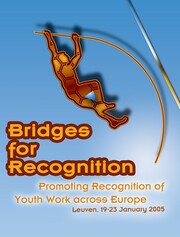How can you prepare for Bridges for Recognition?
Background Documents
- follow the links to dowload the background documents AND find a list of background documents at the bottom of the page
- for most documents you will need a PDF Reader - download a free PDF reader here
- You can also join the Cedefop Virtual Platform on YOUTH issues where discussions are running regarding Bridges for Recognition (Read more here)/>
People (and politicians) started to realise some years ago that our contempory societies are fast changing knowledge societies, and that to keep up with the changes citizens need to be equiped to take full part in society. The European Union, under Portuguese presidency (2000), set itself the aim to be(come) the most competitive knowledge society by 2010 = the so called lisbon strategy.
This led to enhanced efforts in education and training. But not only in the schools, also regarding the identification, assesment and validation of non-formal and informal learning (pdf) taking place out of school, e.g. in youth work. Not only during traditional schooling age, but all through life: the so-called life-long learning.
The youth work sector also is one of the places where young people learn (cfr White Paper on Youth-pdf), but this learning is not always recognised (cfr Youth Forum Policy Paper-pdf). Therefore the European Commission and the Council of Europe elaborated a joint working text to explore Pathways to recognition (pdf.) This document lies at the basis of Bridges for Recognition!
Recognition of Non-Formal Education of youth work is not easy and many discussions take place in Europe on how to make this recognition reality. A European Expert Group however agreed on some Common European Principles of the Validation of Non-Formal Learning (doc).
Some practical tools or instruments for the recognition of youth work or skills gained in youth work have been developed by different organisations and institutions, some of which will be presented at Bridges for Recognition e.g. EuroPass (pdf), European Youth Work Portfolio, etc (see programme).
^^ top ^^
Downloads
The following downloads are available:
- Pathways towards recognition and validation of education, training and learning in the youth field
A working paper jointly prepared (Febrary 2004) by the Youth Unit of the European Commission and the Directorate for Youth and Sports of the Council of Europe exploring possible avenues to enhance recognition of the learning as done in youth work
- Common European Principles for Valication of Non-Formal and Informal Learning
This is the final proposal of an Expert Working Group examining ways to 'making learning attractive and strengthening links between education, work and society'. It elaborates on basic elements in the validation discussions (purpose, stakeholders, modalit
- Adoption of Common European Principles for identification and validation of non-formal and informal
Draft Conclusions of the Council and of the representatives of the Governments of the Member States meeting within the Council on Common European Principles for the identification and validation of non-formal and informal learning
- White Paper on Youth
The European Commission's White Paper on Youth is based on a wide consultation with people from the youth field and draws conclusions regarding the lives and needs of young people and suggests actions to take to respond to these needs.
- Making a European Area of Lifelong Learning a Reality
A communication of the European Commission, sketching the issues at stake when developing lifelong learning strategies in Europe.
- Youth Organisations as Non-Formal Educators
This is a policy paper of the European Youth Forum regarding the recognition of youth organisations as non-formal educators adopted by the EYF member organisations in November 2003. It provides an explanation of recognition as it is understood by the EYF
- Making learning visible: identification, assessment and recognition of non-formal learning
This article of Jens Bjornavold treats the question of how to make learning, which takes place outside formal education and training institutions, more visible. It gives an overview of different approaches taken in different European countries.
- Europass Press Release
Press Release about the new European single framework to for the transparency of qualifications and competences (Europass). Conceived with an eye to lifelong learning, the proposal integrates various transparency promoting instruments (CV, Mobilipass,...)
